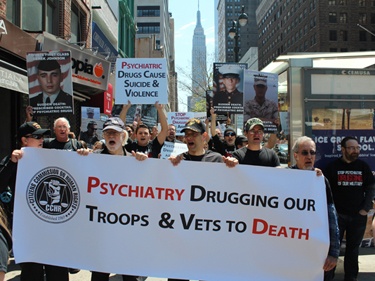The Role of Psychiatric Drugs in Military Suicides and Sudden Deaths
Hundreds of impassioned protesters, including veterans, marched against the American Psychiatric Association which held more than 65 sessions on psychiatric treatment of military personnel, veterans and their families. Retired Colonel John A. Henke, a clinical psychologist and highly decorated Air Force pilot who worked with the Pentagon stated: “Instead of helping veterans recover from war, their pain has been masked with potent drugs. These, including opioid painkillers and mind-altering psychiatric drugs, are feeding addictions and contributing to the fatal overdose rate among VA patients that is nearly double the national average.” Citizens Commission on Human Rights launched a petition requesting the U.S. House of Representatives Veterans Affairs Committee to investigate with public hearings the role of psychiatric drugs in veteran suicides, sudden deaths and recent shootings at Fort Hood and the Washington Navy Yard.





